
International Journal of AEROSPACE Psychology
Scope & Guideline
Innovating Insights into Aerospace Behavior
Introduction
Aims and Scopes
- Human Factors in Aviation:
This area focuses on understanding how human behavior, cognition, and ergonomics affect aviation safety and performance, integrating psychological principles to enhance pilot training, air traffic control, and maintenance operations. - Mental Health and Well-being:
Research in this scope examines the psychological aspects of aviation personnel, including stress, burnout, and mental health interventions, emphasizing their impact on performance and organizational safety. - Technology Acceptance and Human-Technology Interaction:
This involves studying how aviation professionals interact with emerging technologies, such as flight simulators and automated systems, highlighting factors that influence acceptance and effective use. - Training and Performance Optimization:
The journal explores innovative training methodologies, including gamification and virtual reality, aimed at improving the skills and performance of aviation personnel. - Safety Management and Risk Assessment:
This area examines the psychological and organizational factors that contribute to safety in aviation, including the analysis of incidents and the development of frameworks for better risk management.
Trending and Emerging
- Urban Air Mobility and Psychological Implications:
As urban air mobility technologies advance, research is increasingly focusing on the psychological processes influencing public acceptance and behavioral intentions towards these new modes of transportation. - Impact of Mental Health on Aviation Performance:
There is a growing trend towards examining the intersection of mental health and performance among aviation personnel, emphasizing the need for support systems and interventions. - Gamification in Aviation Training:
The use of gamification techniques in pilot and aviation training is on the rise, showcasing innovative methods to enhance learning and engagement among trainees. - Human Factors in Automation and Trust:
Recent studies are increasingly investigating the psychological aspects of trust in automation, particularly how pilots and air traffic controllers interact with automated systems. - Research on Fatigue and Performance:
The focus on fatigue's impact on performance in aviation roles is gaining prominence, addressing critical safety issues and the need for effective fatigue management strategies.
Declining or Waning
- Traditional Pilot Training Methods:
With the rise of innovative training technologies and methods, traditional approaches to pilot training have seen a reduction in emphasis, as new models and simulations take precedence. - General Aviation Safety Studies:
Research specifically targeting general aviation safety has decreased, possibly overshadowed by more pressing concerns in commercial aviation and the integration of new technologies. - Cognitive Load in Non-Flight Contexts:
Studies examining cognitive load related to non-flight tasks in aviation settings have waned, indicating a potential shift towards more flight-centric cognitive research. - Regulatory Compliance and Policy Analysis:
There has been a noticeable reduction in papers focusing on regulatory compliance issues, which may indicate a shift towards more practical applications of psychological research in aviation rather than policy-oriented discussions.
Similar Journals

Human Behavior and Emerging Technologies
Exploring the Nexus of Humanity and InnovationHuman Behavior and Emerging Technologies is a pioneering open-access journal published by Wiley-Hindawi, dedicated to advancing the understanding of the intersection between human behavior and technological innovation. With an E-ISSN of 2578-1863, this journal has quickly established itself as a leading platform for disseminating research from 2019 to 2024 and proudly holds a prestigious Q1 ranking in Human-Computer Interaction, Social Psychology, and Social Sciences (miscellaneous) as of 2023. Its exceptional Scopus rankings place it in the top 1% of journals in the fields of general social sciences, social psychology, and human-computer interaction, underlining its significance in an increasingly technology-driven world. The journal aims to foster interdisciplinary collaboration and explore novel approaches to human behavior, offering insights that appeal to researchers, practitioners, and students alike. As an open-access publication, it enhances accessibility to fundamental research findings that inform policy-making, technological development, and social practices in an era characterized by rapid technological advancement.
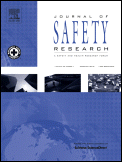
JOURNAL OF SAFETY RESEARCH
Transforming safety discourse with empirical findings.The JOURNAL OF SAFETY RESEARCH, published by Pergamon-Elsevier Science Ltd, stands as a premier platform for scholarly discourse within the domain of safety, risk, reliability, and quality. With an esteemed impact factor and a strong ranking of #38 out of 207 in its category as per Scopus, this journal maintains a distinguished Q1 quartile status, reflecting its influence and significance in advancing safety research since its inception in 1969. Researchers, practitioners, and students alike will find a wealth of knowledge here as the journal explores critical aspects of safety in various contexts, highlighting innovative strategies and empirical findings that contribute to improved safety outcomes globally. Though it operates under a traditional access format, the journal’s extensive repository of articles ensures that vital information remains accessible to its readership. The JOURNAL OF SAFETY RESEARCH is not only a cornerstone for those within the safety engineering field, but also a vital resource for professionals seeking to enhance their understanding of risk management and quality assurance methodologies.
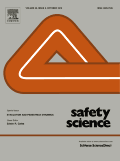
SAFETY SCIENCE
Leading the conversation on occupational and environmental health.SAFETY SCIENCE, published by Elsevier in the Netherlands, is a premier international journal dedicated to advancing the fields of safety research, public health, environmental and occupational health, and risk management. With an impressive impact factor and recognized as a Q1 journal in multiple categories for 2023, its rigorous peer-reviewed articles are essential for researchers, professionals, and students alike. The journal covers a wide range of topics designed to influence safety practices and policies globally. Although Open Access options are not available, the substantial insights provided in each issue underscore the journal's critical role in enhancing the understanding of safety and risk dynamics in a constantly evolving world. With a convergence of knowledge from the years 1991 to 2025, SAFETY SCIENCE remains at the forefront of evidence-based research, stimulating essential dialogues and innovations that shape our approach to safety in various domains.
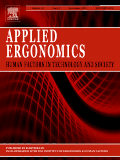
APPLIED ERGONOMICS
Connecting Research and Practice to Improve Human Interaction with TechnologyWelcome to Applied Ergonomics, a premier journal dedicated to advancing knowledge and practice in the multidisciplinary field of ergonomics and human factors. Published by Elsevier Science Ltd, this esteemed journal features a diverse range of research covering critical aspects of physical therapy, human factors, safety, and engineering. With an impressive impact factor and consistently ranked in the Q1 category across multiple domains—including Engineering, Human Factors and Ergonomics, and Safety—Applied Ergonomics serves as a vital resource for researchers, professionals, and students aiming to enhance user experience and optimize workplace safety. With its extensive historical archive dating back to 1969 and continuing through 2025, this journal encourages the dissemination of innovative applications and research findings that contribute to the ergonomics body of knowledge. For those interested in cutting-edge research that directly impacts health and safety practices, Applied Ergonomics is the authoritative source.

Behavioral Psychology-Psicologia Conductual
Fostering Academic Excellence in Psychology ResearchBehavioral Psychology-Psicologia Conductual is a pioneering journal dedicated to advancing the field of psychology, with a specific focus on clinical and experimental domains. Published by FUNDACION VECA PARA AVANCE PSICOLOGIA in Spain, this journal serves as a vital resource for researchers, professionals, and students seeking to explore contemporary practices and theoretical frameworks in behavioral psychology. With its ISSN 1132-9483 and E-ISSN 1132-9483, the journal has established itself over a span of nearly three decades, from 1996 to 2024, contributing significantly to the academic discourse. While it currently holds a Q3 ranking in Clinical Psychology and a Q4 ranking in Experimental and Cognitive Psychology as of 2023, it aims to promote knowledge synthesis and innovative approaches to psychological research. Despite the absence of an open-access model, the journal's rigorous peer-review process ensures the dissemination of high-quality research that resonates with the needs of a growing audience dedicated to enhancing psychological practice and theory.

Zentralblatt fur Arbeitsmedizin Arbeitsschutz und Ergonomie
Championing Ergonomics for a Healthier WorkforceZentralblatt für Arbeitsmedizin, Arbeitsschutz und Ergonomie, published by Springer Heidelberg, is a pivotal academic journal dedicated to the fields of public health, occupational safety, and ergonomics. With an ISSN of 0944-2502 and an E-ISSN of 2198-0713, this journal has been serving the academic community since its inception in 1953, covering a breadth of topics related to workplace health and safety practices. Although currently classified in the Q4 quartile in Public Health, Environmental, and Occupational Health, the journal continues to publish valuable research that impacts both practitioners and policymakers in these essential fields. The journal’s scope encompasses a wide range of studies, evaluations, and methodologies aimed at improving occupational health standards and ergonomic practices. With access options that facilitate global dissemination of knowledge, it aims to foster collaboration and innovation among professionals, researchers, and students committed to enhancing workplace well-being and safety.

Journal of Health and Safety at Work
Shaping the future of occupational health with accessible research.The Journal of Health and Safety at Work, published by the Iranian Occupational Health Association, is a vital resource for researchers, professionals, and students engaged in the fields of occupational health, safety, and environmental management. With an ISSN of 2251-807X and E-ISSN 2383-2088, this Open Access journal has been dedicated to disseminating knowledge since 2012, ensuring that critical research is accessible to a global audience. The journal’s scope encompasses a diverse range of topics including human factors and ergonomics, safety research, and public health, with a focus on enhancing workplace safety and environmental standards. Although currently positioned in the Q4 category across various disciplines within safety and health research, the journal offers a unique platform for emerging studies and innovative practices, making it a significant contributor to the discourse in these fields. The journal's commitment to open access aligns with the growing trend of transparent scholarship, thus facilitating the sharing of vital insights to improve workplace health and safety outcomes. Researchers aiming to publish groundbreaking studies in this pivotal area will find the Journal of Health and Safety at Work an indispensable avenue for advancing knowledge and fostering professional collaboration.
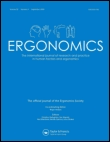
ERGONOMICS
Pioneering insights into ergonomics and human factors.ERGONOMICS is a premier journal that serves the dynamic fields of Human Factors and Ergonomics, as well as Physical Therapy, Sports Therapy, and Rehabilitation. Published by Taylor & Francis Ltd in the United Kingdom, this journal not only boasts a commendable impact factor but also holds a Q2 quartile ranking across its categories, underscoring its influence and academic rigor. With a convergence of significant research dating back to 1957, ERGONOMICS provides a multifaceted platform for the dissemination and discussion of innovative findings that enhance the interaction between people and their environments. Although the journal does not offer Open Access options, it remains a vital resource for researchers, professionals, and students seeking to deepen their understanding of ergonomic principles and applications. Positioned at the intersection of health and human behavior, ERGONOMICS is dedicated to advancing knowledge and promoting best practices in an era where the demand for safe and efficient work environments continues to grow.

Nature Human Behaviour
Advancing the science of behavior and cognition.Nature Human Behaviour, published by Nature Portfolio in the United Kingdom, stands at the forefront of interdisciplinary research, connecting the fields of Behavioral Neuroscience, Experimental and Cognitive Psychology, and Social Psychology. With its commitment to publishing groundbreaking studies, this prestigious journal is categorized within the Q1 quartiles for 2023, indicating its elite status and significant influence in the academic community. Recognized globally with a remarkable Scopus ranking of #1 in multiple psychology and neuroscience categories, it showcases the highest quality research, thus appealing to students, professionals, and researchers alike. Despite being a subscription-based journal, its impactful scientific discourse continues to shape understanding of human behavior in social contexts. With the ambition to elucidate the complexities of human interaction and cognition, Nature Human Behaviour serves as an essential resource for anyone dedicated to advancing the realm of human behavioral sciences.
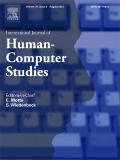
INTERNATIONAL JOURNAL OF HUMAN-COMPUTER STUDIES
Illuminating the Future of Human-Computer StudiesINTERNATIONAL JOURNAL OF HUMAN-COMPUTER STUDIES, published by Academic Press Ltd - Elsevier Science Ltd, stands at the forefront of research dedicated to the dynamic interplay between humans and technology. With a remarkable impact factor reflective of its rigorous academic standards and its prestigious ranking in the Q1 category across vital disciplines such as Education, Engineering, Human Factors and Ergonomics, and Human-Computer Interaction, this journal serves as an essential resource for researchers, professionals, and students alike. Spanning from 1994 to 2024, it showcases pioneering studies that contribute significantly to the understanding of cognitive processes, usability, and the evolving role of technology in society. Despite the absence of Open Access options, access to this journal is facilitated through institutional subscriptions, ensuring that critical findings and advancements are readily available to a global audience. By continuing to publish high-quality research, the INTERNATIONAL JOURNAL OF HUMAN-COMPUTER STUDIES plays a crucial role in advancing the field, fostering innovation, and guiding future research directions.